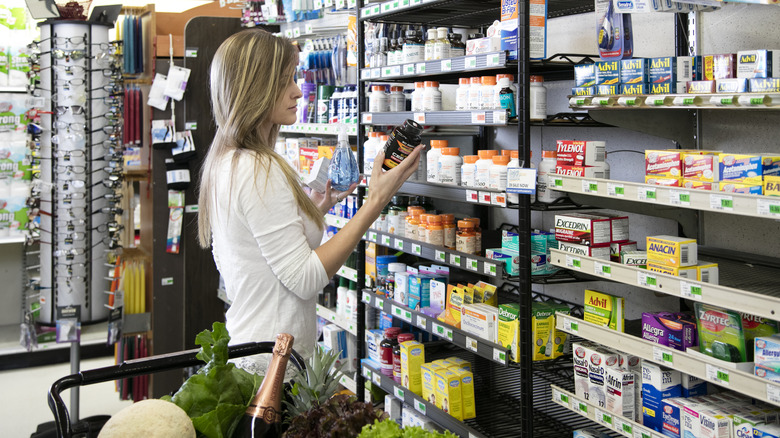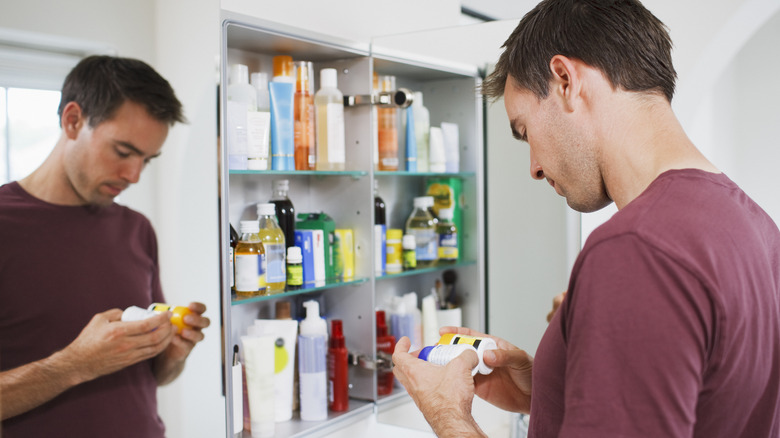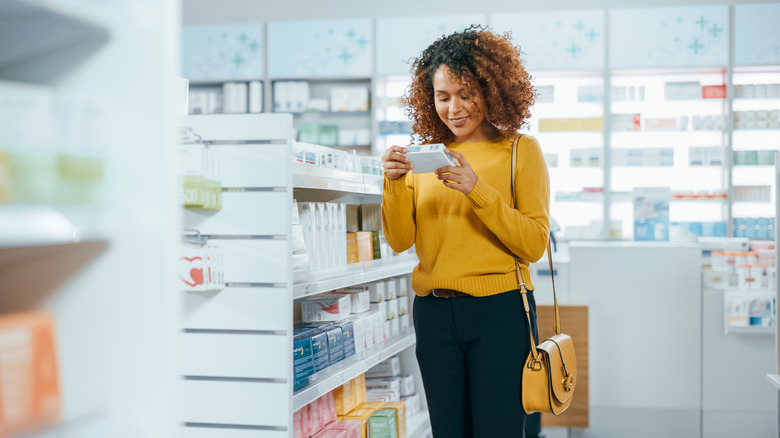The Risk Of Buying Supplements At The Grocery Store
How many supplements do you take in a day? Almost 58% of adults in the United States take at least one supplement every month, and it's a $160 billion business (via Great Green Wall). That's a lot of melatonin and vitamin C. Even if you just take a multivitamin every day, do you notice a difference?
Despite the fact that many people take supplements, two-thirds of people say they don't feel they work. Interestingly, according to the medical community, there isn't enough evidence to support taking vitamins and minerals to improve your health, per Harvard Medical School. The catch is that supplement manufacturers can use words like "supports" or "promotes" without getting into trouble with the Food and Drug Administration. Thus, we confidently pop, say, fish oil supplements to support our heart health.
According to a survey from Pew Charitable Trust, many people believe that manufacturers must prove to the FDA that their supplements are safe, and that the FDA tests these supplements before they are marketed to the public. However, the FDA doesn't approve the safety or efficacy of any dietary supplements before they're sold in stores. The agency also doesn't monitor how much of an ingredient is in a supplement, which is why you might want to avoid picking up supplements while you're at the grocery store. Instead, you'll want to do a little research about your supplement and the manufacturer beforehand.
What's on the supplement label isn't what's in the bottle
Maybe you learned on TikTok about "nature's Ozempic" — berberine. Although some people might take berberine to help treat type 2 diabetes, there's no guarantee that what's in each capsule is what's stated on the label. A 2019 study in the Journal of Dietary Supplements looked at 15 different brands of berberine and found that nine of them didn't meet the standard potency requirement established by the U.S. Pharmacopeial (USP) Convention. The study also found that the pricier brands weren't necessarily the highest quality.
Researchers also found inconsistencies in the potency of vitamin D, according to a 2013 paper in JAMA Internal Medicine. Per the study findings, just one-third of vitamin D supplements met USP standard potency, which is 90% to 110% of vitamin D. Some vitamin D supplements had as little as 9% potency.
If you take melatonin gummy every once in a while to help you sleep, you might want to find a reputable brand. A 2023 study in the Journal of the American Medical Association looked at 25 brands of melatonin gummies and found that the amount of melatonin varied as much as three times more than what was stated on the label. Shockingly, only three melatonin products had within 10% of what the label said.
How to find a reputable brand of supplement
Even though the FDA only issues guidelines for supplements, some organizations can help you find more reputable brands. Some supplement manufacturers will submit their products to get a USP Verified Mark on their labels. The USP is an independent lab that works with the FDA to develop standards for supplement potency. It also verifies that the potency of the product is what's on the product label. Similar to what the FDA does for drugs, the USP inspects the facility that manufactures the supplement and verifies the sourcing of the ingredients. However, there aren't many brands verified by the USP.
NSF also has a certification program that verifies a supplement's ingredients and looks for toxic substances, microorganisms, mycotoxins, and pathogens. It also performs annual audits and periodic testing of the supplements it approves. You can look up your supplement in NSF's database to see which brands it has certified. For example, nine manufacturers are listed for melatonin, such as Amazon, Klean Athlete, and Wegmans.
Consumer Lab is a member-supported organization that independently tests and reviews supplements. It also publishes warnings from the FDA and case studies about some supplements. Although it publishes reviews for free, you'll need to pay a $5 per month membership fee to get detailed information about which brands are best for each supplement. Lastly, Memorial Sloan Kettering Cancer Center suggests buying supplements from major pharmacies and health stores and only purchasing supplements made in the United States.



